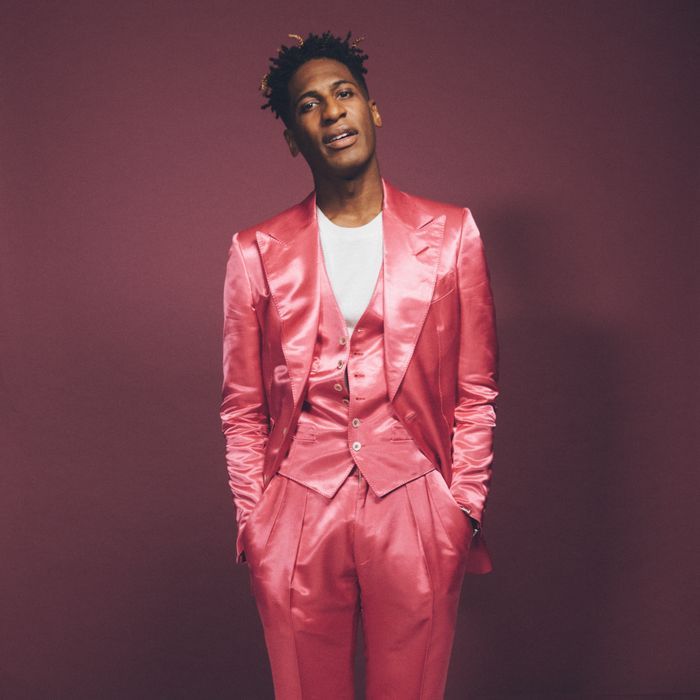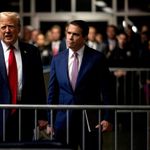
Jon Batiste, in a lilac turtleneck and flap-pocket jacket in mauve, settles down next to the same enormous Steinway he plays on The Late Show. He’s been the program’s bandleader for six years, and he video calls me from the giant art gallery in New Jersey where he’s been filming during the pandemic. But the show is just one job among many; last year Batiste completed a musical, wrote a symphony, and scored Pixar’s Soul. Between it all, the New Orleans native wrapped what he calls his “first’’ record (his previous dozen merely saw him “crafting and building and evolving,” he says). The result is “We Are”, out today. It’s a funky frisée of hip hop, jazz, and plenty of vocals from Batiste himself, who tends to croon mid-conversation, and even sings a few notes in greeting.
This summer, during the protests against police brutality, you led a peaceful protest in Manhattan. It was a music march, so people brought their instruments, and at one point, you had something like 5,000 people singing Whitney Houston and even shut down Sixth Avenue. How did that come to be?
I had been doing these processional marches and calling them “Love Riots,” and what better time is there for something like that than when the world is on fire?
If you’re not doing it in those times, then you have to question if you’re really about what you say you’re about. It’s much easier for me to stay at home and not risk getting sick, getting other people sick, and getting assaulted in more ways than one, but you have to do what’s right.
You’ve mentioned that protesting is not exactly something CBS wants you to be doing. Were you worried about backlash?
There was a lot, professionally, that could have unfolded at the time. We didn’t know people’s positions. We didn’t know where corporations stood. But I felt like somebody had to get up in there and do something to represent the things that we all say that we want to represent with our music and with our philosophies.
You and Colbert talk about race on the show quite a lot, and you’ve done a few of these joke-y PSAs under the rubric “Hey White People.” Did you pitch those?
Those were a collaboration between myself and one of the writers who is no longer on the show. Anything that’s involving race with the show … I think it’s important for me to be involved in the pitch and the structure of it, because so many people are represented when you start to talk about a race of people.
Is that a lot of pressure for you?
It’s a lot of pressure when you start to feel that you have to be the end all be all for your race. I don’t feel like I need to be that. I’m just a leader. Sometimes they disagree. Sometimes they may even clash. But if you’ve experienced enough to know what you’re talking about, and you’ve earned the authority of the leadership that you have, then you just let the chips fall where they fall.
Have you faced pushback?
Yes, but I don’t even see it. I mean, of course, I feel it as a human. But I really don’t register it. People have said things. But people always are gonna say something. That’s important for you to know if you are in the public eye. Let them say what they got to say.
I liked your Kamala song, by the way.
MVP! That’s a historic thing that this country did. The song is R&B — it’s a sexy kind of music — but it ain’t about how she looks, even though she’s obviously a beautiful woman. It’s about her accomplishments. That’s what it’s all about.
I wonder if she has seen it.
I don’t know. In fact, I have a call with the Biden administration tomorrow. I should ask them.
In the past year — in addition to your day job — you’ve scored Soul, written a symphony, and finished a musical. And then you made this album. How are you so productive?
It’s interesting that you call it ‘productive’ — I don’t separate my life from my creative practice from my connection to the creator. So it’s not necessarily that I’m productive. It’s more about a flow state.
What’s this ‘flow state,’ and how do I get into it? Is it work-life balance? Is it a routine?
You can’t routine your way into it. In my faith and in the Black church, we call it the Holy Spirit. All of a sudden, it’s something that strikes you, like, Oh, my goodness, and all you can do is be in service to it.
Your new album sounds like it might have been a product of flow state. It’s also completely different from your previous work — you’re singing more, rapping more — it’s less instrumental.
It is very, very different. It has the classic feel I was trying to imitate when I was growing up. My mentors — Stevie Wonder, or Quincy Jones, who wrote the liner notes for the album — when they listen to it, they hear that in it.
What’s Quincy Jones like to work with?
Q … It’s like working with a king or the pope or something like that. He has stories about everything. You could say something about Reeboks, and he’ll have a story about that, and it’s always the most outlandish story.
We got 500 new vinyls that arrived just now. [Batiste pulls out one of the vinyls of his new album.]
What are you wearing on that cover? The red garment.
It’s a cloak, you see?
From where?
This is from Tunisia.
You’re into fashion?
I love it. What kind of clothes you like?
Me? I’m one of those wear-all-black types of people.
The whole time?
Yeah. I just like it.
Wow, that’s deep. That’s a different vibe. It’s simple.
But you’re very colorful. What’s your favorite outfit right now?
I love turtlenecks, I got a bunch of turtlenecks. I have a lot of jeans. I like jeans now. I didn’t like jeans for a long time, but I like jeans right now. It’s nice to wear a good pair of jeans for weeks at a time. It’s just so rugged. I love big black boots and big white sneakers. Like these.
[Batiste holds foot up in the air.]
Reeboks?
Yeeeah.
You grew up in this big musical family, a musical dynasty, really. Did you ever want to be anything besides a musician growing up … like a doctor or an astronaut?
I wanted to be everything. Astronaut was one of them, actually. I remember seeing that Tom Hanks movie, Apollo 13. Then we did a field trip to the planetarium, where we saw all of the stars in the air, and I was interested in the astronaut life.
And then I ended up having some luck as a musician, but I may not even be a musician for the whole of my life. I could see myself doing a lot of different things. I’m not one of these people who is set on defining myself via a profession.
What’s a genre of music that you just can’t stand to listen to?
I don’t like satanic music because I’m a Christian.
Say you had a dinner party with three people, alive or dead. Who would you invite?
Ooh, the dead part is deep — that’s cold-blooded. They all gonna be dead because alive is too easy. I would talk to our Lord and Savior Jesus Christ to see how I’m doing …
So Jesus is coming, who else?
The way I’m thinking about it is a religious figure, a scientist, and then somebody who just got a lot of hustle. Somebody with a bunch of stories. Like either Cleopatra or Mansa Musa, from the 14th century, African emperor. And Nikola Tesla. Yeah … and Pharrell. You’ve got to put Louis Armstrong on the list. And Jeff Daniels — Michael Jackson’s choreographer.
What would you serve them?
I’d serve them red beans and rice and fried chicken, but it’d be a semi-healthy version — like, brown rice.
I’m a little worried that God isn’t going to eat meat.
It depends on what period of him you get — Old Testament or New Testament. Or he might be on some other stuff now that we ain’t even hip to. Or you could put in John the Baptist. He probably will be really tough to be at a dinner party with. Everybody would be partying and drinking, and he’d be like, Y’all just don’t understand.






